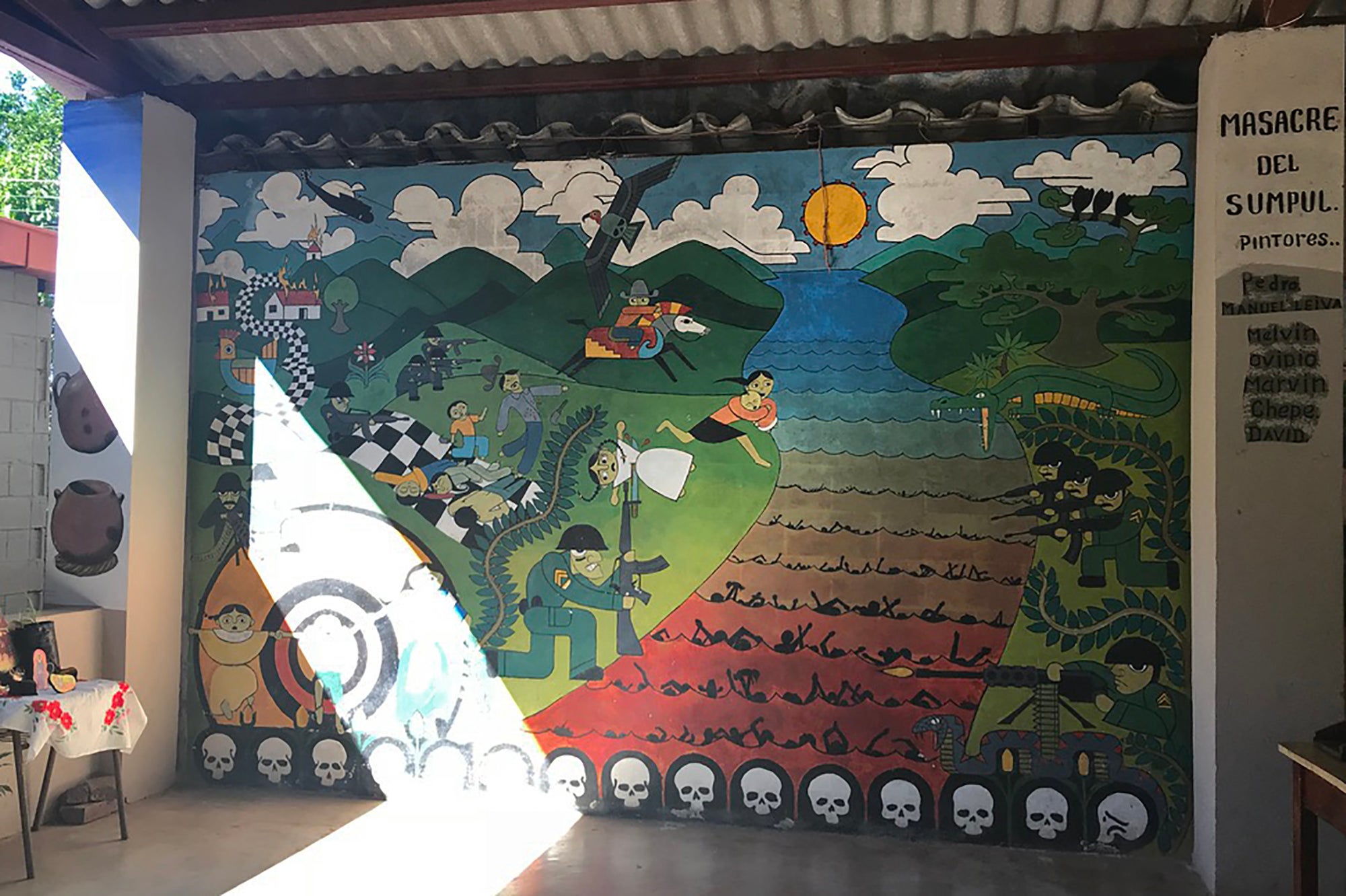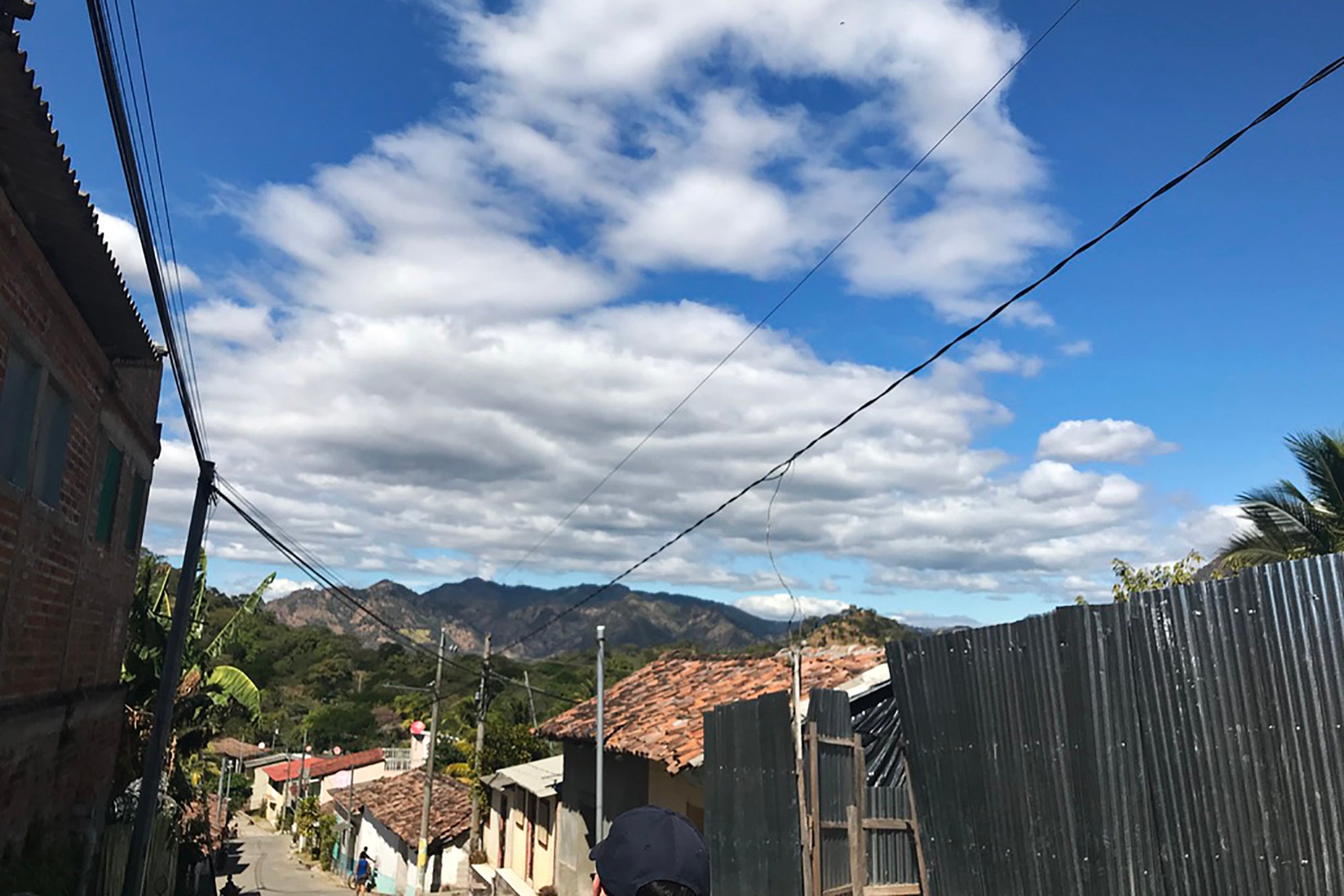It’s still difficult for Rosa Rivera Rivera to talk about the village she grew up in. Decimated by the Salvadoran Civil War that left more than 75,000 civilians dead, she hasn’t been back to the land since 1977.
With the help of an interpreter, she told WPR that her childhood home just outside of Arcatao, El Salvador had been completely destroyed by bombs. The village was never rebuilt.
[[{“fid”:”1528171″,”view_mode”:”embed_portrait”,”fields”:{“alt”:”Rosa Rivera y Rivera stands in front of photographs from the Salvadoran Civil War.”,”title”:”Rosa Rivera y Rivera stands in front of photographs from the Salvadoran Civil War.”,”class”:”media-element file-embed-portrait media-wysiwyg-align-right”,”data-delta”:”2″,”format”:”embed_portrait”,”alignment”:”right”,”field_image_caption[und][0][value]”:”%3Cp%3EMember%20of%20the%20Arcatao%20Historical%20Memory%20Committee%2C%20Rosa%20Rivera%26nbsp%3BRivera%20stands%20in%20front%20of%20photographs%20from%20the%20Salvadoran%20Civil%20War.%26nbsp%3B%3Cem%3EPhoto%20courtesy%20of%26nbsp%3BXiaolei%20Tang%3C%2Fem%3E%3C%2Fp%3E%0A”,”field_image_caption[und][0][format]”:”full_html”,”field_file_image_alt_text[und][0][value]”:”Rosa Rivera Rivera stands in front of photographs from the Salvadoran Civil War.”,”field_file_image_title_text[und][0][value]”:”Rosa Rivera Rivera stands in front of photographs from the Salvadoran Civil War.”},”type”:”media”,”field_deltas”:{“2”:{“alt”:”Rosa Rivera y Rivera stands in front of photographs from the Salvadoran Civil War.”,”title”:”Rosa Rivera y Rivera stands in front of photographs from the Salvadoran Civil War.”,”class”:”media-element file-embed-portrait media-wysiwyg-align-right”,”data-delta”:”2″,”format”:”embed_portrait”,”alignment”:”right”,”field_image_caption[und][0][value]”:”%3Cp%3EMember%20of%20the%20Arcatao%20Historical%20Memory%20Committee%2C%20Rosa%20Rivera%26nbsp%3BRivera%20stands%20in%20front%20of%20photographs%20from%20the%20Salvadoran%20Civil%20War.%26nbsp%3B%3Cem%3EPhoto%20courtesy%20of%26nbsp%3BXiaolei%20Tang%3C%2Fem%3E%3C%2Fp%3E%0A”,”field_image_caption[und][0][format]”:”full_html”,”field_file_image_alt_text[und][0][value]”:”Rosa Rivera Rivera stands in front of photographs from the Salvadoran Civil War.”,”field_file_image_title_text[und][0][value]”:”Rosa Rivera Rivera stands in front of photographs from the Salvadoran Civil War.”}},”link_text”:false,”attributes”:{“alt”:”Rosa Rivera Rivera stands in front of photographs from the Salvadoran Civil War.”,”title”:”Rosa Rivera Rivera stands in front of photographs from the Salvadoran Civil War.”,”class”:”media-element file-embed-portrait media-wysiwyg-align-right”,”data-delta”:”2″}}]]”It’s really hard for me to return,” she said. “When I lived there, I lived with my parents, siblings, cousins, aunts and uncles, and they were all murdered in the ’80s. They were all killed.”
News with a little more humanity
WPR’s “Wisconsin Today” newsletter keeps you connected to the state you love without feeling overwhelmed. No paywall. No agenda. No corporate filter.
Now Rivera Rivera lives in Arcatao, a small town on the El Salvador-Honduras border and sister city to Madison, Wisconsin. And while the community itself has been rebuilding since the civil war ended in they early 1990s, residents are still grappling with post-war trauma — both physical and mental.
“Here in Arcatao we’re all victims or survivors of the armed conflict, or have relatives that are also victims or survivors, and we hadn’t received any support from the government,” she said. “For a long time, you know, there’s been this need for psychosocial support from the government and we’ve only had it from the solidarity, from the Sister City relationships with Wisconsin.”
The conflict, which lasted from 1979 to 1992, pitted the Salvadoran military against a coalition of left-wing groups called the Farabundo Martí National Liberation Front, or FMLN. The United States provided both funding and training to the Salvadoran military — which carried out a number of human rights violations including kidnappings, rape and mass executions of civilians.
The war ended with the Chapultepec Peace Accords, which were signed in 1992.
After the war, delegations from the Madison Arcatao Sister City Project began traveling to Arcatao, making several trips over the last few decades. Dr. David Rosenthal, a professor in the Department of Rehabilitation Psychology and Special Education at the University of Wisconsin-Madison, has been traveling to Arcatao since 1998. He said those first several years were dedicated to making connections and learning about the community’s needs.
During a trip in 2015, Rosenthal spoke with the mayor of Arcatao about the need for mental health care. With a background in counseling and rehabilitation, Rosenthal knew he had something to offer.
Rosenthal applied for a grant in 2017 which led to the creation and funding of the Arcatao Mental Health Project in 2018.
“Our emphasis is not pathologizing the community, not diagnosing … it’s more realizing, ‘Well, the community has PTSD at large.’ Even the kids that weren’t experiencing the war have experienced it vicariously,” Rosenthal said.
[[{“fid”:”1528166″,”view_mode”:”embed_landscape”,”fields”:{“alt”:”Psychologist Rosy Manzana facilitates a group therapy session in Arcatao, El Salvador.”,”title”:”Psychologist Rosy Manzana facilitates a group therapy session in Arcatao, El Salvador. “,”class”:”media-element file-embed-landscape media-wysiwyg-align-right”,”data-delta”:”3″,”format”:”embed_landscape”,”alignment”:”right”,”field_image_caption[und][0][value]”:”%3Cp%3EPsychologist%20Rosy%20Manzano%26nbsp%3Bfacilitates%26nbsp%3Ba%20group%20therapy%20session%20in%20Arcatao%2C%20El%20Salvador.%26nbsp%3B%3Cem%3EPhoto%20courtesy%20of%26nbsp%3BXiaolei%20Tang%3C%2Fem%3E%3C%2Fp%3E%0A”,”field_image_caption[und][0][format]”:”full_html”,”field_file_image_alt_text[und][0][value]”:”Psychologist Rosy Manzano facilitates a group therapy session in Arcatao, El Salvador.”,”field_file_image_title_text[und][0][value]”:”Psychologist Rosy Manzano facilitates a group therapy session in Arcatao, El Salvador. “},”type”:”media”,”field_deltas”:{“3”:{“alt”:”Psychologist Rosy Manzana facilitates a group therapy session in Arcatao, El Salvador.”,”title”:”Psychologist Rosy Manzana facilitates a group therapy session in Arcatao, El Salvador. “,”class”:”media-element file-embed-landscape media-wysiwyg-align-right”,”data-delta”:”3″,”format”:”embed_landscape”,”alignment”:”right”,”field_image_caption[und][0][value]”:”%3Cp%3EPsychologist%20Rosy%20Manzano%26nbsp%3Bfacilitates%26nbsp%3Ba%20group%20therapy%20session%20in%20Arcatao%2C%20El%20Salvador.%26nbsp%3B%3Cem%3EPhoto%20courtesy%20of%26nbsp%3BXiaolei%20Tang%3C%2Fem%3E%3C%2Fp%3E%0A”,”field_image_caption[und][0][format]”:”full_html”,”field_file_image_alt_text[und][0][value]”:”Psychologist Rosy Manzano facilitates a group therapy session in Arcatao, El Salvador.”,”field_file_image_title_text[und][0][value]”:”Psychologist Rosy Manzano facilitates a group therapy session in Arcatao, El Salvador. “}},”link_text”:false,”attributes”:{“alt”:”Psychologist Rosy Manzano facilitates a group therapy session in Arcatao, El Salvador.”,”title”:”Psychologist Rosy Manzano facilitates a group therapy session in Arcatao, El Salvador. “,”class”:”media-element file-embed-landscape media-wysiwyg-align-right”,”data-delta”:”3″}}]]Using the grant funds from UW-Madison, the group connected with local psychologist Rosy Manzano and sent her to San Francisco in 2019 to be trained in the community resiliency model — a therapy technique that focuses on how trauma affects the nervous system, and provides people skills to mitigate that stress.
After the training, Manzano — who has worked with survivors of war and domestic violence for more than two decades — started providing individual and group sessions aimed at alleviating the symptoms of trauma.
“There were so many years during the armed conflict that people didn’t have the space or the time to deal with those losses. If they did, then they would die,” Manzano said through an interpreter. “From my point of view of psychology, I work with grief that has not been resolved, grief that has remained for a long time.”
Manzano said the project has given people the space to work on their mental health — something they didn’t have before.
“The government never developed any projects or supports … so really, this project has filled that need in the community,” Manzano said. “It is truly saddening that the community of Arcatao had to request support from another country that could meet their needs, due to El Salvador ignoring the need of caring for the mental health of victims and survivors of the conflict.”
Now, with the COVID-19 pandemic easing, members of the Arcatao Mental Health Project hope to make their fourth trip to Arcatao sometime in the spring. For Rosenthal, ensuring the project is sustainable on the ground is paramount.
“I’m a gringo thousands of miles away, and you don’t want to get into a savior kind of mentality,” he said. “It’s a university and U.S.-generated project, but it really has to become an El Salvadoran project. And to be sustainable it really has to become Arcatao-generated in terms of the decisions and the personnel.”

Rivera Rivera has seen the community take to the project, but she says there’s still a lot of healing left to be done.
“There are people who it’s so hard for them to talk about what happened that they can’t even speak — some people who have lost children or other loved ones — and I have seen, through the process of mental health, the change in how people can talk about their experiences,” she said.
“We’re really trying to help people not to forget about what happened, but to heal,” Rivera Rivera continued. “When we can get to the point where we can talk about it and at least contain or somewhat control our tears, then we’ll know that we’re on the right path to healing.”
Editor’s note: UW-Madison PhD student Hannah Fry translated the interviews for this story.
Wisconsin Public Radio, © Copyright 2025, Board of Regents of the University of Wisconsin System and Wisconsin Educational Communications Board.


